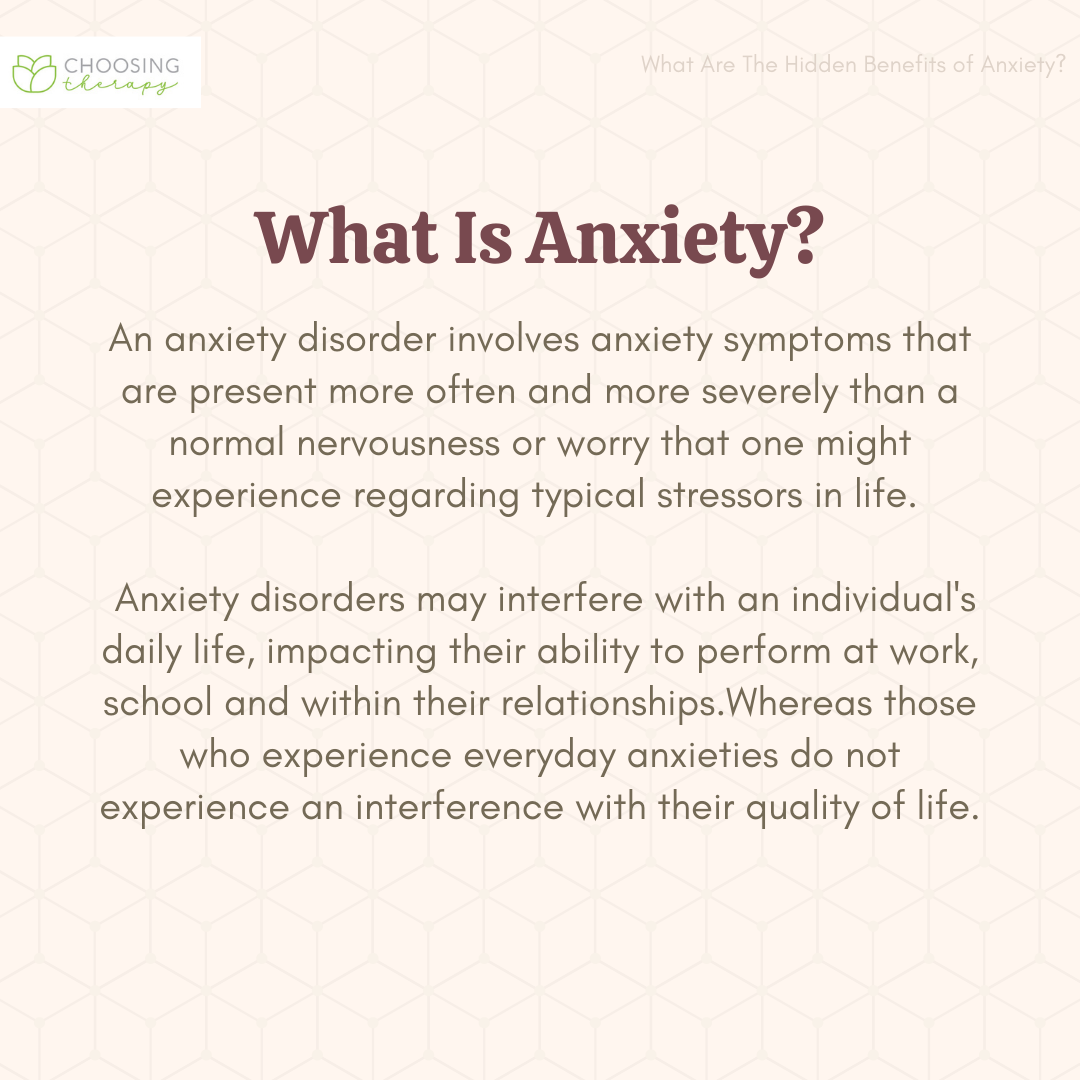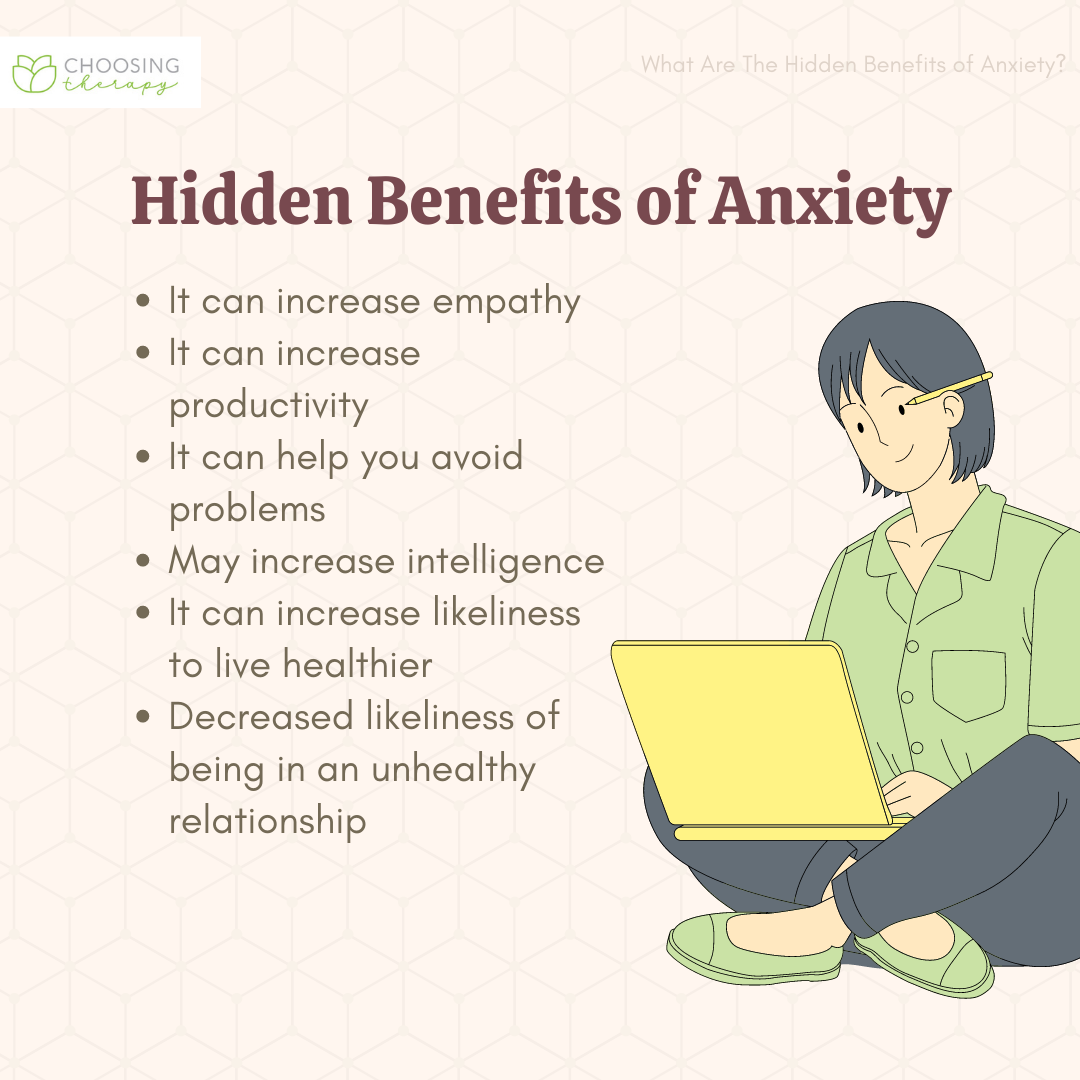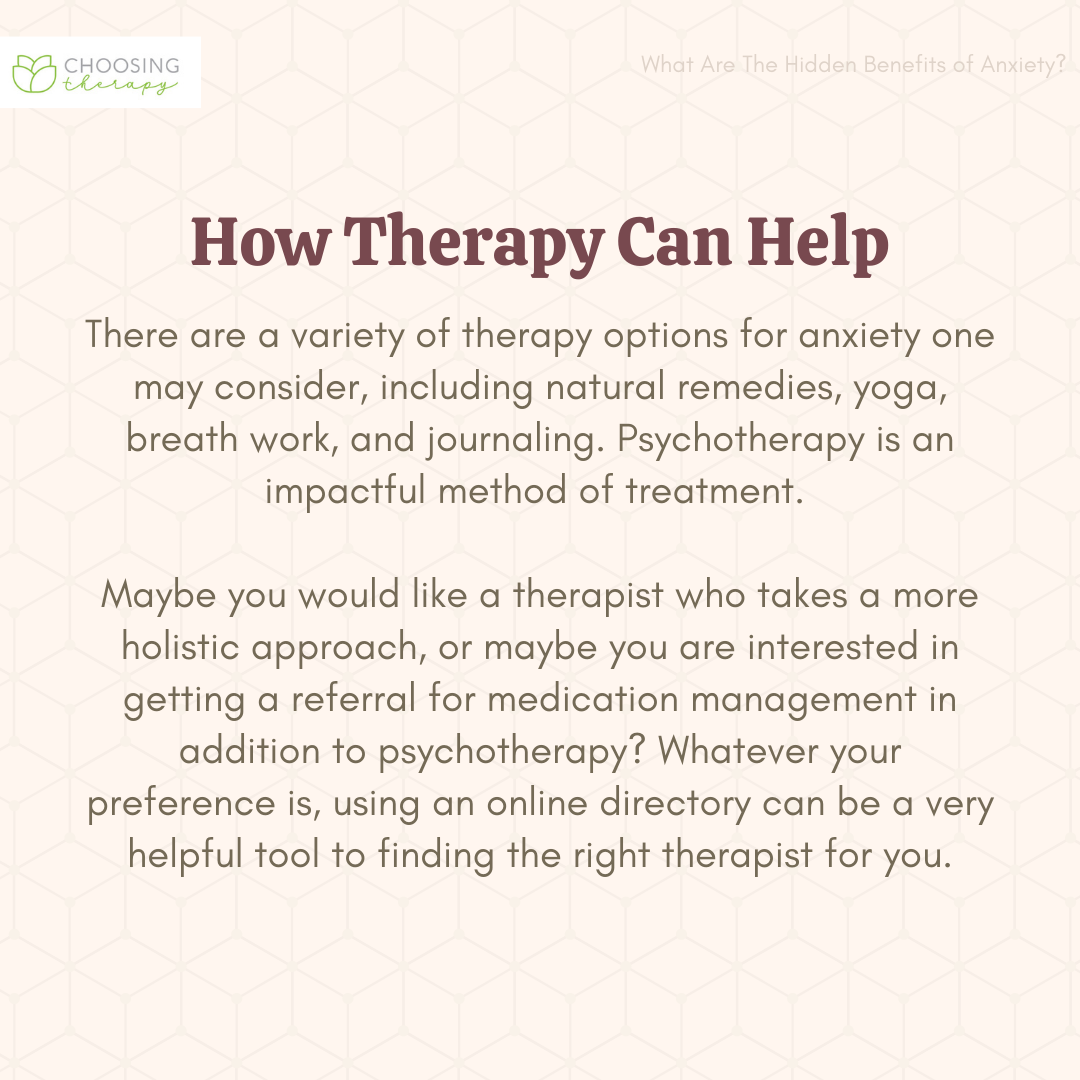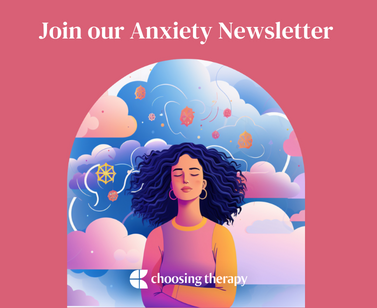
Anxiety is most often perceived as a negative feeling or emotion, and extreme anxiety can disrupt daily functioning. However, there could be some hidden benefits of anxiety. Experiencing certain levels of anxiety may lead to productivity, an ability to predict outcomes, a tendency to remain organized, and an avoidance of potentially dangerous situations.1
Find a supportive therapist who can help with anxiety.
BetterHelp has over 20,000 licensed therapists who provide convenient and affordable online therapy. BetterHelp starts at $65 per week. Take a Free Online Assessment and get matched with the right therapist for you.
What Is Anxiety?
An anxiety disorder involves anxiety symptoms that are present more often and more severe than a normal nervousness or worry that one might experience regarding typical stressors in life.2 There are multiple types of anxiety disorders and an estimated 31.1% of American adults will experience anxiety at some point in their lifetime.3 Anxiety disorders may interfere with an individual’s daily life, impacting their ability to perform at work, school and within their relationships.3Whereas those who experience everyday anxieties do not experience an interference with their quality of life.2
Anxiety Disorders include Generalized Anxiety Disorder (GAD), Panic Disorder, Social Anxiety Disorder, and Phobia-Related Disorders.2There are a multitude of symptoms that may be experienced unique to each specific anxiety disorder. This article will focus mostly on the benefits that are related to the experience of Generalized Anxiety Disorder and Social Anxiety Disorder.
Here are some common symptoms of Generalized Anxiety Disorder (GAD):2
- Feelings of being on-edge
- Easily fatigued
- Difficulty with concentration
- Irritability
- Excessive worrying
- Sleep problems
Here are some common symptoms of Social Anxiety Disorder:2
- Blushing or sweating in social situations
- Stomachaches
- Increased heart rate
- Difficulty making eye contact
- Speaking softly or quietly
- Feeling self-conscious or fearing people will judge them
6 Hidden Benefits of Anxiety
Although anxiety disorders may be chronic and exhausting to experience, anxiety may have some positive attributes. Some benefits to anxiety may include an increase in empathy, improved levels of productivity, and improved skills for avoiding problems. It is also believed that those who experience anxiety are more intelligent, may live healthier lives and are less likely to get into an unhealthy relationship.
Anxiety can be viewed as the brain’s intention to protect oneself from a perceived or potential threat or danger. When an individual reframes their way of viewing their anxiety to that perspective, it may help ease their level of anxiety and increase their ability to implement additional positive coping skills.
Below are six hidden benefits of anxiety:
1. It Can Increase Empathy
Those who experience anxiety may be more empathetic towards others; particularly, those with social anxiety disorder. This may be because they are hypervigilant of what is going on around them or what other people are doing and how they may be feeling. Those with anxiety, in general, may be more sensitive towards other peoples’ feelings and experiences. Being more sensitive toward others can help with developing healthier relationships with loved ones, as empathy increases one’s likeness to consider other people when making decisions. Empathy may also increase an individual’s desire to learn about and understand another person’s perspective.
2. It Can Increase Productivity
Anxiety often triggers the “fight or flight” response. This can be reframed into a benefit, as the individual can channel their pent up energy into creating to-do lists and completing tasks. That physiological response may even feel like adrenaline at times, which may lead an individual to trying new things, being creative, or engaging in healthy active activities. Studies show exercise is good for mental health and yoga can decrease anxiety symptoms. Additionally, anxiety can help with meeting deadlines for work, school or other projects.
3. It Can Help You Avoid Problems
Anxiety often arises when an individual is worrying about the future or ruminating on the past. Worrying about the future or thinking about the past can be viewed in a perspective that anxiety causes “forward thinking” which can help an individual consider different potential outcomes. Considering things that have happened in the past and applying what one has learned from past situations can help in the present and lead to an individual being better prepared for possible outcomes. It may even increase ability to handle problems that unexpectedly come up.
Options For Anxiety Treatment
Talk Therapy – Get help from a licensed therapist. Betterhelp offers online therapy starting at $65 per week. Free Assessment
Psychiatry for Anxiety – Looking for anxiety treatment that prioritizes you? Talkiatry can help. Find an in-network psychiatrist you can see online. Get started with our short assessment. Visit Talkiatry
4. May Increase Intelligence
Individuals with anxiety may be more likely to have a fear of failing, which leads them to have a motivation to succeed. Research has shown that there is a link between those with anxiety and higher intelligence. Due to their increased creativity and tendency to analyze things around them, those with anxiety have been found to be intelligent. By redirecting their energy into learning new things, individuals with anxiety increase their intellectual potential.7
5. It Can Increase Likeliness to Live Healthier
Certain foods and unhealthy lifestyle choices can make anxiety worse, like diets high in sugar or a lack of good sleeping habits. Those who experience anxiety tend to make healthier lifestyle choices because of this.7 Healthy habits that help manage symptoms of anxiety may include making healthier food choices, like avoiding processed sugars and caffeine. Additionally, engaging in yoga or other forms of exercise can promote relaxation while also increasing the happy chemicals in the brain.7 Regular exercise can also improve sleeping patterns to reduce the impact of a lack of sleep on mental health.
6. Decreased Likeliness of Being in an Unhealthy Relationship
An individual who experiences anxiety is likely to be hypervigilant of what is going on around them and may be more observant of behaviors that other people have. Having this awareness can help them with avoiding individuals who may have qualities that would be unhealthy in a relationship. Those who experience anxiety are also thought to have emotional intelligence, which also helps when getting to know another person.7
How Therapy Can Help
When seeking treatment for anxiety, it is important to consider what type of methods you would like to take. There are a variety of therapy options for anxiety one may consider, including natural remedies, yoga, breathwork, and journaling. Psychotherapy is an impactful method of treatment, and finding the right therapist may take some time, but it is worth considering qualities you would like in a therapist; maybe you would like a therapist who takes a more holistic approach, or maybe you are interested in getting a referral for medication management in addition to psychotherapy. Whatever your preference is, using an online directory can be a very helpful tool to finding the right therapist for you.
Treatment options or approaches for anxiety disorders may include:
- Cognitive Behavioral Therapy (CBT): CBT for anxiety is an evidence-based treatment approach that typically involves changing an individual’s thinking patterns.4 It has been researched extensively, and has shown to be a highly effective treatment method for those with anxiety.4
CBT is a treatment approach utilized by a mental health professional and involves teaching individuals new ways of thinking, behaving and reacting to situations to help feel less anxious.2 - Acceptance and Commitment Therapy (ACT): ACT is another treatment approach that is utilized in psychotherapy with a mental health professional. Unlike CBT, ACT uses strategies like mindfulness and goal setting to reduce symptoms of anxiety.2 There is less research done on the effectiveness of ACT for anxiety, as it is a newer form of psychotherapy approach.2
- Medications: There are three common classes of medications that are prescribed by certain health care providers, like a psychiatrist or primary care physician.2The three most common classes of anxiety medications include anti-anxiety medications, antidepressants, and beta-blockers.2 It is important to note that medications for anxiety are utilized to help relieve symptoms of anxiety, not to cure the disorder.2
- Eye Movement Desensitization and Reprocessing Therapy (EMDR): EMDR is a specialized therapy that a mental health professional must be trained and certified in, which qualifies them to practice EMDR with clients. EMDR for anxiety is a proven treatment approach to ease anxiety, which is done by reprocessing an individual’s memories.
- Acupuncture: Acupuncture is an ancient practice within Traditional Chinese medicine.5 It is believed that acupuncture can improve overall health by applying hair-thin needles to certain points to create energy flow.5 Some studies have shown that acupuncture for anxiety can help reduce symptoms of generalized anxiety disorder, as acupuncture produces a natural sense of calm and relaxation.
- Meditation: Meditation has been found to reduce anxiety and can improve an individual’s ability to redirect their thoughts, self-regulate, increase acceptance and experience cognitive changes.6 Meditation for anxiety can be utilized as an added practice to enhance the benefits of other treatment approaches like psychotherapy or medications. There are different types of meditative practices that include loving-kindness meditations, body scans, imagery, mindfulness, mantra meditation, grounding, and more.
In My Experience
In my experience of working with individuals diagnosed with anxiety disorders, I have seen the benefit of using a number of these treatment approaches, interventions and coping skills for anxiety. I have also come to learn that there are benefits that can result from having anxiety. Reframing the way one views their anxiety can be a powerful tool. For example, rather than wanting the anxiety to go away, which typically exacerbates the symptoms of anxiety, breathing into the anxiety and “going with the flow of it” can allow the anxiety to ease and the individual to become more functional.
When the anxiety decreases to a tolerable level, it can be redirected into a task, leading to an increase in productivity. I always encourage my clients to be patient with themselves and to utilize the coping skills that work best for them, as coping skills are not a one size fits all. I suggest working with a therapist who will help guide you along your journey of exploring positive coping skills that work well for you and managing your anxiety.
Additional Resources
To help our readers take the next step in their mental health journey, Choosing Therapy has partnered with leaders in mental health and wellness. Choosing Therapy is compensated for marketing by the companies included below.
Talk Therapy
Online-Therapy.com – Get support and guidance from a licensed therapist. Online-Therapy.com provides 45 minutes weekly video sessions and unlimited text messaging with your therapist for only $64/week. Get Started
Virtual Psychiatry
Hims / Hers If you’re living with anxiety or depression, finding the right medication match may make all the difference. Connect with a licensed healthcare provider in just 12 – 48 hours. Explore FDA-approved treatment options and get free shipping, if prescribed. No insurance required. Get Started
Anxiety Newsletter
A free newsletter from Choosing Therapy for those impacted by anxiety. Get helpful tips and the latest information. Sign Up
Learn Mindfulness, Meditation, & Relaxation Techniques
Mindfulness.com – Change your life by practicing mindfulness. In a few minutes a day, you can start developing mindfulness and meditation skills. Free Trial
Choosing Therapy Directory
You can search for therapists by specialty, experience, insurance, or price, and location. Find a therapist today.
Online Anxiety Test A few questions from Talkiatry can help you understand your symptoms and give you a recommendation for what to do next. How Does ERP Help With Intrusive Thoughts? Obsessive compulsive disorder (OCD) is a psychiatric condition marked by the presence of obsessive thoughts, images, doubts, or urges, followed by compulsive behaviors or acts aimed at easing the distress caused by the obsession. While the content of the obsessions can take many forms, they are always repetitive, persistent, involuntary, and intrusive, and they often result in a great deal of anxiety for the person experiencing them.










